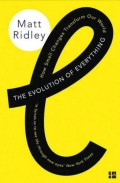The central statement of Matt Ridley is that everything is based on evolution. Small changes result in the transformations of our world. In his view there is one strong and dominant myth about the world, a mistake we all make, that is that we assume that the world is the outcome of top-down, planned changes. Ridley unmasks this myth in The evolution of everything; how small changes transform our world.
Evolution implies the emergence of something from something else. The characteristics of the evolution process concerns incremental and gradual, spontaneous and inexorable. Usually starting with simple beginnings, starting from within, often without any goal but with an open mind where to end up. Just following a narrative from one phase to the next. For the contrast: it is not a revolutionary process and not directed from outside or top-down. That means in the thinking of Matt Ridley there is no place for a planner or designer. In his book The evolution of everything; how small changes transform our world he gives many examples of evolution: morality, culture, economy and technology; but also genes, mind, personality and religion. The essential thinking is that everything is man-made and human-invented, even religion: no God without humans. And Ridley gives other striking examples, such as government and leadership.
Ridley uses the metaphor of a 'skyhook', an imaginary device for hanging an object in the sky. A 'skyhook' is the opposite of a crane: just hanging without a mechanism. The history of western thinking is dominated by skyhooks for explaining the world as the outcome of designers and planners: cosmic orders, the word of God, the hand of the monarch. And in organizations, the leader’s words and his planned change. The main characteristic of the skyhook is that we want to create top-down prescriptions by which we should live. But we forget Epicurus (the physical and human world and the morality emerges spontaneously). And we forget De Rerum Natura (the Nature of Things) written by the Roman poet Lucretius who developed a certain agenda for modernity by saying there is no end or purpose to existence, there is only creation and destruction, governed entirely by chance.
Spontaneous developments, bottom-up you see in the evolution of morality as a spontaneous phenomenon. There is no need for God as a designer or a planner, implanting benevolence in the human minds. People develop their moral codes themselves. The role of the moral philosopher is to observe and record the conventions and teach them back to people as if they are top-down instructions. But first it starts as emergent process as you see with new technology in the medical world. Moral philosophers do not invent morality. We can read the same phenomenon in The evolution of everything in the chapters about language, culture and civilisation. Cultures are always on the move, but the process is without choreographers or leaders with overall plans. A culture reacts to local events and effects. There are only emergent processes resulting in mutations in ‘an unplanned beauty’.
But government leaders think that they have the competence of a divine hand to plan and create a few hundred thousand jobs. But economy is also mainly an evolutionary phenomenon with emerging stimuli. As Adam Smith said, there are invisible human actions, but not a designer. Processes of exchange and specialisation, processes of innovation with creative destruction (Schumpeter) among ordinary people. And these innovation processes can emerge only if people are free to exchange ideas in an environment without direction, controls and plans.
There is a very strong ‘great man’ theory that lives on in big business. And every organization is directed nowadays as a profit business. Even in the age of internet, says Ridley, most companies are set up like feudal fiefs, with a king in charge or a god invested with near supernatural reputation. Ridley contrasts this world with the business environment in most western countries: fluid, egalitarian, dynamic and a digital economy; cobwebs with horizontal interactions and informal co-makers. And the bosses work with Holy Scriptures prescribing what people should do and how they should behave. Top-down things, planned actions and the CEO as a great designer and at the same time blocking emerging processes coming up from the bottom. He is not aware of the capacities of his people: thinking, energetic, creative and caring that lead to a self-managed business. He has his own top-down talks and no eye for the bottom-up narratives.
The evolution of everything; how small changes transform our world is an interesting book for people who will develop more insight in the emerging processes in society. The book can give input for deep reflections on 'skyhook' thinking and approaches.
Peter van den Boom is consultant at Boom Training and Consultancy and lecturer for Mmaster & MBA programs. He is also author of many articles and books.
